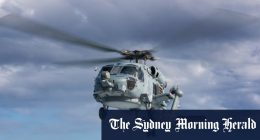The EU faced furious remonstrations from Kyiv as Europe’s leaders looked set to hold back from imposing the potentially most damaging sanction on Russia, even as the Kremlin lay siege to Ukraine via land, air and sea.
Ukraine’s foreign minister, Dmytro Kuleba, voiced his anger as EU heads of state and government appeared likely to decide against blocking Russia from an international payments system through which it receives foreign currency.
With casualties mounting, Kuleba warned that European and US politicians would have “blood on their hands” if they failed to impose the heaviest toll on Moscow by cutting Russia from the so-called Swift payments system.
“I will not be diplomatic on this,” he tweeted. “Everyone who now doubts whether Russia should be banned from Swift has to understand that the blood of innocent Ukrainian men, women and children will be on their hands too. BAN RUSSIA FROM SWIFT.”
The Society for Worldwide Interbank Financial Telecommunication (Swift) is used by over 11,000 financial institutions to send secure payment orders and is key to the movement of funds to Russia’s oil and gas sector.
Removing Russia from the system, it is argued, would make it close to impossible for financial institutions to send money in or out of the country, with consequences for both the country’s oil and gas sector and its European customers.
A number of member states believe there is nothing to be gained from waiting, a position shared by the UK government.
During a call with the German chancellor, Olaf Scholz, the British prime minister, Boris Johnson, urged allies to react with the harshest measures, warning that “western inaction or underreaction would have unthinkable consequences”.
UK sources said Johnson had also made a major play for leaders to withdraw Russia’s access to Swift during his G7 speech to other world leaders. Canada’s Justin Trudeau was the only other leader to express support for finding a way to enforce the ban.
“On Swift, I think we all recognise that it is something that has to be done in conjunction with our major allies and will only be successful if that can be achieved as such, we are continuing those discussions,” Johnson’s spokesman said. “There are a range of views on it and we recognise it is a challenge. But it is certainly the prime minister’s intention so we will continue to have those discussions.”
The Irish taoiseach Micheál Martin said his government would also support “the strongest possible sanctions”.
Lithuania’s president Gitanas Nausėda, said the EU needed to learn the lessons that the bloc’s previous sanctions had been “too weak”.
“We cannot have the luxury of being a discussion club,” he said. “Discussions are useful but we cannot forever be in discussions… They need our support today, tomorrow might be too late”.
Poland’s prime minister Mateusz Morawiecki said that the EU had to united around severe sanctions “on Putin, on Russia” if Europe was to be relevant around the world.
“This is now a critical moment for the history of the European union, the history of Europe,” he said. “The whole free world is looking at us, at what kind of sanctions, what kind of reactions”
Diplomatic sources suggested that Germany, Cyprus and Italy were among the member states who were the most concerned about taking the measure at this stage, arguing that some leverage needs to be maintained.
“Someone started a war and we want this war to stop here and now,” one EU diplomat explained of the caution over Swift. “You always need to have some doors open to be able to have a dialogue to stop a war.”
The diplomat added that the measures that did have unanimous support within the EU would “be much more effective with high cost and consequences than doing one single issue on Swift, which might be needed for things which are very relevant for some EU member states.”
The fissure in the united front with Ukraine came as EU leaders gathered in Brussels for what is set to be one of the most testing summits for a generation, with the bloc’s capacity to strike convincingly at Russian interests in question.
Following a meeting with the Nato secretary general, Jens Stoltenberg, the European Commission president, Ursula von der Leyen, said the EU would degrade Russian industry, push its economy into recession and block exports of irreplaceable components.
“These sanctions will suppress Russia’s economic growth, increase the borrowing costs, raise inflation, intensify capital outflows and gradually erode its industrial base,” she said. “We want to cut off Russia’s industry from the technologies desperately needed today to build a future.”
Von der Leyen said the Kremlin would be brought to account through “massive and targeted sanctions” over its “barbaric” action. “Our measures will weaken Russia’s technological position in key areas, actually from which the elite makes most of their money. And this ranges from hi-tech components to cutting-edge software,” she said.
“This will also seriously degrade the Russian economy in all areas in the future. Let me be very clear: It is President Putin who will have to explain this to his citizens. I know that the Russian people do not want this war.”
Belarus will also be subject to a sanctions package that has yet to be prepared for its role aiding Russia’s invasion from its territory, according to a leaked draft of an EU summit communique.
But at a meeting of EU ambassadors, a consensus on the need for a major package of sanctions across the financial and energy sectors was marred by a lack of support for what many regard as the most damaging of actions, both for Moscow and European countries with the closest trading ties to Russia.
Those opposed – dubbed the “incrementals” – were said to be pushing to hold back from imposing the most onerous measures.
Officials suggested that Swift may be held back as part of a “third tranche” of sanctions. It is argued by some diplomats in Brussels that Russia could find ways around being blocked from Swift and that the other measures would be just as significant in squeezing the Kremlin.
The more hawkish EU capitals have also privately voiced concerns that a number of key oligarchs will be left out of the coming package of EU measures. The Dutch government was vocal behind the scenes in seeking to include a larger number of the wealthy and powerful around Putin, according to sources.
There is irritation in Brussels that the UK government is not being strong enough on hitting oligarchs such as Roman Abramovich, whose private jet was reportedly tracked leaving Monaco for Russia earlier on Thursday.
Source: Guardian






